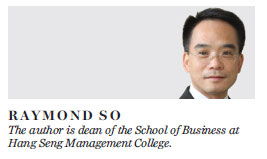More investment in innovation will boost competitiveness
Updated: 2016-06-10 07:55
By Raymond So(HK Edition)
|
|||||||||
Competitiveness is important for the sustainable development of an economy. With no natural resources, Hong Kong depends very much on its human resources and efficient institutional and infrastructural systems as well as on innovation to carve out a role for itself in the international arena. Combined together, these strengths make a difference. Their importance is also understood by people around the world. Many economies place great emphasis on such strengths because they are vital to international competitiveness.
There are many indicators of international competitiveness, all of which generally have at least three implications for Hong Kong. The first one is about self-evaluation: If Hong Kong is weak in one international competitiveness index, this can be seen as a sign that the city needs to lift its game. The second one is about the relative position of Hong Kong in the international marketplace: It helps Hong Kong understand what lies ahead and who the biggest competitors in the region are. The third one is about the structure of Hong Kong's competitiveness: It sheds light on areas where Hong Kong needs to improve.
Hong Kong's international competitiveness ranking has been a matter of public concern in the city. Whenever a report is released, no matter whether the ranking of Hong Kong goes up or down it will always generate huge coverage in local newspapers.
Recently, the International Institute for Management Development (IMD) of Switzerland issued a ranking report on international competitiveness, which ranked Hong Kong as the world's most competitive economy. This is indeed an encouraging message. IMD enjoys a high international academic reputation; its annual ranking report is well respected by both academia and industry groups. It is worth noting that the ranking exercise focuses on "institutional development". As Hong Kong has unparalleled advantages in government and business efficiencies, it thus ranks No 1 in this league.
In fact, there are different ranking exercises on competitiveness which emphasize different criteria. These rankings, all compiled by reputable agencies, yield different results because their criteria differ.
Therefore, it is rather common for Hong Kong to score differently in various ranking exercises, even within a short period of time.
In contrast to the encouraging results of the IMD report, Hong Kong only ranked seventh in the World Economic Forum's competitiveness rankings. This relatively weaker overall performance is mainly due to a weaker performance in scientific research and innovation.
From the results of two different ranking reports, we can comfortably say that on the whole Hong Kong is still a competitive economy. Its strengths lie in its institutional factors; from a forward-looking perspective, an economy needs innovation and research to maintain its competitiveness. The IMD report emphasizes the competitiveness of the institutional factors while the World Economic Forum focuses on future competitiveness.
For Hong Kong, innovation and research are the weak spots; it clearly needs to catch up with its rivals in these areas. This means the government should provide more support for scientific research and innovation. The usual practice of merely providing tax incentives and land grants is no longer enough to meet the needs in these areas. Innovation and research requires investment in human resources; education is the only way to enhance the overall quality of human resources. Clearly, the government needs to make a greater investment in education.

(HK Edition 06/10/2016 page6)